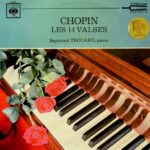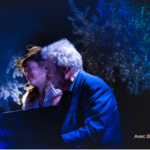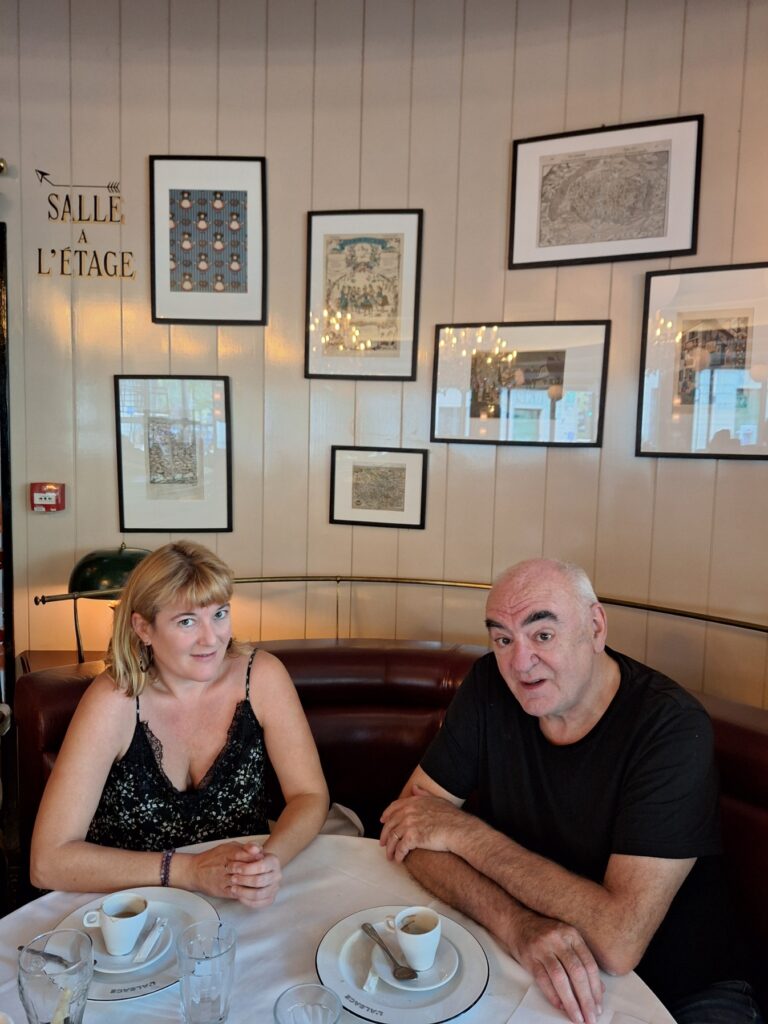Following the release of the last two albums by pianist Alexandra Lescure, I suggested an interview during a Parisian lunch to this resident of Aix-en-Provence.
Studies
Her family was not musical, but at home, young Alexandra was interested in the library of classical music vinyls, whose covers captivated her.  Around the age of eight, she would listen for hours to Rachmaninov concertos or Chopin waltzes by Raymond Trouard:
Around the age of eight, she would listen for hours to Rachmaninov concertos or Chopin waltzes by Raymond Trouard:
“I could play a piece on repeat and I would often have tears of joy, it was a shock, a form of profound revelation, I was overwhelmed by this discovery that spoke to me better than words, that nourished my flaws or exacerbated my exaltation. I remember the first time I heard Carmen around the age of 9, I was completely seized, the feeling of discovering something that is obvious to life, that you don’t know but that nevertheless seems essential to you.”
She waited almost nine years to start playing the piano for logistical reasons, which initially prompted a strong opinion from her teacher in the village: “To play the piano at a conservatory, it’s too late!”
Faced with this state of affairs, Alexandra seemed to want to take up her first challenge:
“I felt that my story would be written around the piano, a conviction that was difficult to explain. When I told him that I really wanted to take the entrance exam for the Conservatory, he let me learn a required prelude in E major by Bach, not easy at all!”.
She worked on it during the holidays and played it for him when she returned. He was impressed by the astonishing progress and prepared her for the Conservatory, which she quickly joined!
“I passed the competitive exam and entered the class of pianist Michel Bourdoncle, an excellent musician who mainly makes his career abroad. Everything happened very quickly, since four years later, I passed my conservatory prize while going to college. However, I aspired to be open to other worlds than that of the piano, particularly with figure skating, which I practiced several times a week while attending high school until obtaining my literary baccalaureate. You had to be very organized to be able to spend four hours of piano on the weekend and an hour and a half every weekday evening. I liked structuring and organizing my schedule in order to achieve my goals, I was very independent and motivated.”
“Michel Bourdoncle immediately passed on to me his taste for sound, beautiful sound, poetic colors, sentence construction, respect for a text and polyphonic awareness. I then entered the international competition preparation class at  Marseille for two years with Bruno Rigutto. Bruno impressed me and also gave me great confidence. He has this ability that great teachers have to reveal even more to yourself. I also studied with Jacques Rouvier and Prisca Benoit who deeply shaped my vision of the link between gesture and sound on the piano as well as my overall vision of pedagogy. This very clear teaching taught me to be aware of my work as a craftsman. One of my pillars is also Bernard d’Ascoli with whom for more than ten years I worked around fascinating discussions on sound material, the conduction of a melody, the frames or phrasing in baroque music, the breathing and micro caesuras essential to the intelligible and sensitive modeling of music.”
Marseille for two years with Bruno Rigutto. Bruno impressed me and also gave me great confidence. He has this ability that great teachers have to reveal even more to yourself. I also studied with Jacques Rouvier and Prisca Benoit who deeply shaped my vision of the link between gesture and sound on the piano as well as my overall vision of pedagogy. This very clear teaching taught me to be aware of my work as a craftsman. One of my pillars is also Bernard d’Ascoli with whom for more than ten years I worked around fascinating discussions on sound material, the conduction of a melody, the frames or phrasing in baroque music, the breathing and micro caesuras essential to the intelligible and sensitive modeling of music.”
Beginnings
Michel Bourdoncle has organized many concerts for his students thanks to partnerships in different Eastern countries. Alexandra Lescure has subsequently developed a great deal of stage experience, particularly in concert music, since at the age of twenty she began touring in France and abroad, particularly in concertos by Haydn, Mozart, Beethoven, Mendelssohn and Chopin.
Between 2003 and 2013, she gave many concerts in recital or in duo with Michel Bourdoncle, her partner for more than ten years on stage and in the city. Together they have a daughter born in 2013 who is already a very young pianist.
Stage and recordings
Since 2015, she has devoted herself to her discography with three albums around Mozart, Haydn, Scarlatti, Royer or Duphly, to the tour of a Chopin piano-theatre show with Etienne Kippelen and to the Festival Les Nocturnes Sainte-Victoire that she co-directs.
This Festival is very varied: gastronomy, wines, classical music, world music, theater, dance, etc.
“You are talking to me about Pascal Amoyel, who we received at the festival; he recently wrote to me that he was preparing a Chopin show, while I am preparing a Beethoven show myself. Piano-theater works very well these days and the public loves it. Pascal Amoyel is a master in the field, I was overwhelmed by his Looking for Beethoven. On the other hand, if I suggest Duphly to certain organizers, they most often tell me that they prefer to program Chopin, which I understand for a question of filling. Nevertheless this is unfortunate because for a record to live fully, it must be accompanied by the stage”.
“My producer Benoit d’Hau and I invest a balance that tries to compensate with sales but especially with downloads. The main expense items are first the sound engineer, but also the room and the piano. I have been lucky to always record in the Campra auditorium, a real setting with exceptional acoustics set with two Steinway grand concert pianos available”.
“I also teach as an artistic education professor at the Conservatoire de Cabriès, near Aix-en-Provence where I live. Our structure has a magnificent auditorium with a very beautiful Yamaha where we can organize many concerts and artistic projects”.
Repertoire
“There is Bach, to whom I constantly return to drink like a regenerating and inspiring source, then Duphly, Royer of course, Chopin, and Beethoven. I like to discover rare repertoires, I have notably studied and played the music of Luis Giannéo (1897-1968), a brilliant Argentinian composer. I have worked very little on Russian music, perhaps because of the size of my hands, I like the poetry of Debussy or Ravel. I am interested in contemporary music, notably Schnittke or Ligeti, whom I appreciate, in improvisation, which I have practiced during concerts with François Rossé, and in digital creation in music, notably on the painting of Fabienne Verdier, who inspires me so much. I am sensitive to poetry, particularly that of René Char, which I like to mirror with the baroque repertoire with the great storyteller Yanowski. The alliance of the word in music particularly appeals to me. This year, I return to Mozart’s concertos which have always amazed me. I would say that my favorite repertoire is around the 18th century.”
Pantheon of pianists
Clara Haskil, MariaTipo, Marcelle Meyer, Radu Lupu, Vladimir Horowvitz, Arturo Benedetti Michelangeli, Lucas Debargue or Maria Joao Pires and so many others. In concert, Daniil Trifonov, Konstantin Lifschitz or Dang Thai Son particularly struck me. The harpsichordists William Christie or Scott Ross, the ingenious freedom and the architectural nonchalance of Jean Rondeau.
Projects
In 2025, she continues to tour with the piano-theater show and begins a tour around Mozart’s concertos 19 and 21 in Romania and Moldova, the country of her roots. Her daughter Ava Lescure Bourdoncle will create Etienne Kippelen’s first piano concerto, a Mozart-Kippelen program that will be given at the Les Nocturnes Sainte-Victoire 2025 festival. There will be seven or eight dates over fifteen days for the next edition. On disc, she has several projects under consideration.
“For my Duphly recording, out of twelve months of preparation, I spent six with my arm in a cast following a fall. Working away from the instrument ultimately allowed me to have a richer intellectual and sensitive conception of the works”
To conclude with Moldova, a little anecdote that the pianist tells us about her grandmother who was the daughter of the poet and ambassador Cincinnat Pavelescu: after his stay in France, the latter married Alice Viardot, the granddaughter of Pauline Viardot, a friend of Chopin, Sand and Clara Schumann. Incredible discovery! She also learns that her illustrious ancestor was a cultural attaché in the Moldovan city of Chisinau in the 1920s and that he helped build the philharmonic hall in which she played her very first concerto with orchestra: Chopin’s 1st in 2003.
We’ve come full circle!
Ava
Is your daughter following in your footsteps?
 “She is only eleven years old, but has already participated in competitions, concerts, academies, she takes part in our Chopin show, etc. She must do about ten hours of piano per week and has time to develop in many areas.”
“She is only eleven years old, but has already participated in competitions, concerts, academies, she takes part in our Chopin show, etc. She must do about ten hours of piano per week and has time to develop in many areas.”

